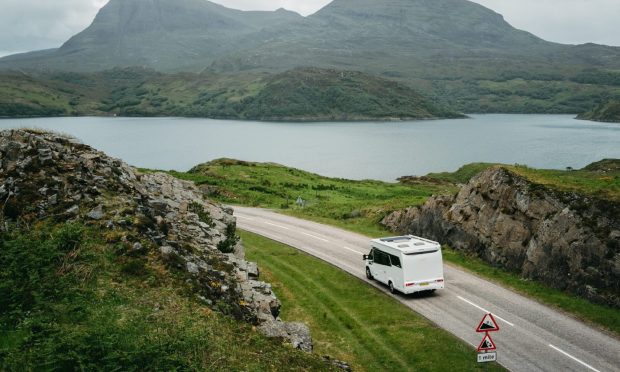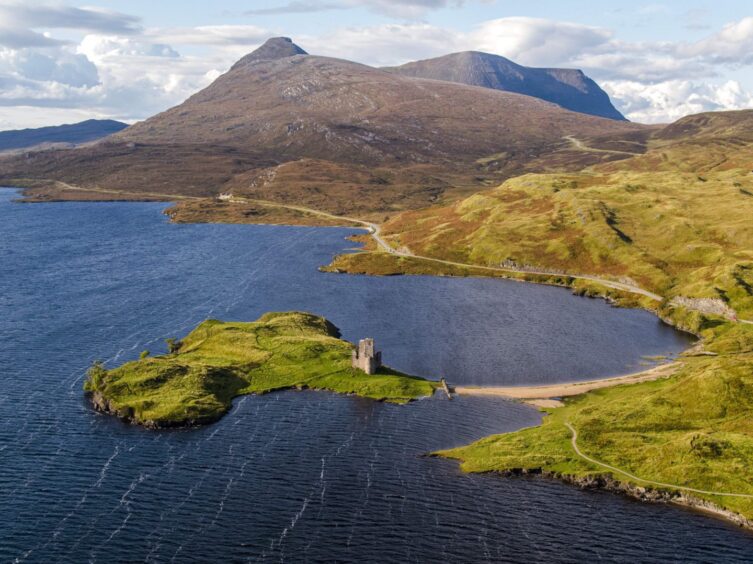The organisation behind “Scotland’s ultimate road trip” is preparing for another busy season.
North Coast 500 Ltd (NC500 Ltd) has been behind the promotion of the 516-mile Highland tourist route since it begun in 2015.
After seeing an increase in visitors from pre Covid numbers last year, it continues to work closely with businesses and groups in order to “enhance the visitor experience”.
Interim chair David Hughes believes NC500 has transformed the tourism concept into “one of Scotland’s most iconic travel experiences” in its nine years.
The route begins and ends in Inverness.
Becoming a more sustainable experience is key, says interim chair.
Mr Hughes said the team’s preparations have been both “broad and deep”.
Focuses include becoming a more sustainable experience, enhancing visitor education, and developing deeper community engagement.
Mr Hughes said: “We’ve prioritised initiatives that enhance the visitor experience while preserving the natural and cultural integrity of the Highlands.
“These efforts include developing new visitor resources and supporting local businesses.
“As well as engaging closely with the Highland Tourism Group and Visitor Management group.”
The route saw a post Covid boom in visitor numbers during 2020/21 due to oversea travel restrictions.
Once travel restrictions were relaxed and removed in 2022, the tourist attraction saw a decline of 35%.
Last year visitor numbers saw a rise, with a slight increase on pre Covid numbers.
The group have already begun North Coast 500 planning beyond 2024 as part of its vision.
He added: “We are committed to nurturing a legacy of responsible, enriching travel that respects the delicate balance between growth and preservation.
“As we look forward, we will be guided by the principles of sustainability, community, and mutual respect.
“Ensuring the North Coast 500 continues to be an experience of inspiration for generations to come.”
Will the North Coast 500 see a rise in overseas visitors in 2024?
NC500 Ltd has seen an increase in international travellers as well as continued interest from domestic “staycations”.
Mr Hughes believes the demographics signal “a healthy balance and a bright future” for the region’s tourism.
He also thinks the tourist attraction has seen “remarkable growth and evolution” in the past nine years.
Mr Hughes said: “It’s a testament to the appeal of the North Highlands landscape, rich cultural heritage, and the warm, welcoming spirit of our communities.
“The most significant change over these years has been the marked increase in motorhome usage and the surge in staycations.
“Particularly highlighted during and following the Covid-19 pandemic. This period catalysed a profound shift in travel preferences and behaviours.
“With restrictions on international travel prompting many to explore closer to home, discovering the unparalleled beauty and diversity of their own country.”
Trends, including the increase in motorhome travelling, have allowed NC500 Ltd to adapt and enhance our digital platforms, according to Mr Hughes.
He added: “We have also worked closely with the Highland Council, Visit Scotland, Police Scotland, and other public agencies.
“To identify areas of concern to help in improving facilities and services to ensure a more accessible and enjoyable experience for all.
“Our commitment to sustainable, responsible tourism has never been stronger.”
‘Collaboration is at the heart of everything we do’
Mr Hughes is always speaking to businesses, residents and visitors to make sure all are catered for.
He said: “Collaboration is at the heart of everything we do at NC500, involving an array of stakeholders across various sectors and regions.
“This collective approach, while rewarding, is not without its challenges.
“In the past year, we’ve worked tirelessly to balance the needs and expectations of local residents, businesses, and visitors.
“A significant focus has been on establishing communication channels to ensure that the benefits of tourism are widely shared. Whilst addressing and seeking to minimise any negative impacts.
“The impact on villages and towns across the NC500 route has been insightful.
“Beyond the economic benefits, which are substantial, it has provided a platform for showcasing the unique crafts, traditions, and culture of the Highlands, creating new opportunities for local businesses.
“This has not only boosted local economies but has played a crucial role in sustaining some smaller communities.
“We are not blind to the potential difficulties and negative impacts that an increase in visitors may have had.
“We will continue to work hard to minimise these as much as we possibly can.”





Conversation